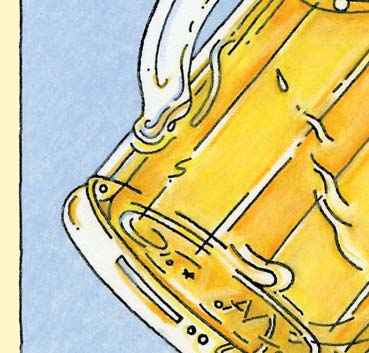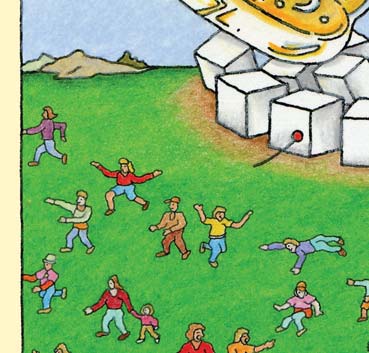B Is for Beer (2 page)






This one is for Blini.
Have you ever wondered why your daddy likes beer so…
9
At Sunday school the next morning, Gracie took a seat…
18
Have you ever felt—or imagined—that there is more than
one…
20
If it is the ambition of every Pop-Tart to be…
25
“Technically speaking,” explained Uncle Moe,
“it was not a beer…
29
The week passed as slowly as a snowman’s gas. Each…
35
For better or for worse, lots of kids these days…
43
A disco ball after an earthquake? Let’s get serious, kids.
51
Glug glug glug. The golden liquid was so cold it…
57
Tasting the stale barf in her mouth, Gracie was pretty…
61
For a scary moment, Gracie was sure her skull was…
67
“Can you guess where we are?” asked the Beer Fairy.
72
It’s rather obvious that Gracie and the Beer Fairy were…
79
Uncle Moe had told Gracie that once in a strange,…
85
It was nice to be outdoors again. The day remained…
90
As the shrieking maiden, wild-eyed and bloody-kneed, neared the summit…
99
“Suppose, for example,” said the fairy, who was increasingly showing…
105
Well, boys and girls, assuming you’ve been paying attention, you…
113

Have you ever wondered why your daddy likes beer so much? Have you wondered, before you fall asleep at night, why he sometimes acts kind of “funny” after he ’s been drinking beer? Maybe you’ve even wondered where beer comes from, because you’re pretty sure it isn’t from a cow. Well, Gracie Perkel wondered those same things.
“Mommy,” Gracie asked one afternoon, “what ’s that stuff Daddy drinks?”
9
t om r obbins
“You mean coffee, sweetie?”
“Not coffee. Ick! That other stuff that ’s yellow and looks like pee-pee.”
“Gracie!”
“
You
say pee-pee.”
“Well, when I’m talking about potty time I might. But I don’t say it about somebody’s beverage.”
Gracie giggled. Her mother, who was busy loading clothes in the washer, suggested without looking up, “I believe, dear, you’re talking about beer.”
“Oh!” squealed Gracie. “That ’s right.
Beer
. That stuff that ’s always on TV.” She deepened her voice. “ ‘Better tasting!’
‘Less filling!’ ‘Better tasting!’ ‘Less filling!’ ” She giggled again. “Is it kinda like Pepsi for silly old men?”
Mrs. Perkel smiled, but it was such a weak, wimpy smile a kitten could have knocked it halfway to Milwaukee.
She paused in her work to stare out of the laundry room 10
b is for beer
window. The clouds themselves looked like a big pile of dirty laundry. That was not unusual because, you see, the Perkel family lived in Seattle.
Do you know about drizzle, that thin, soft rain that could be mistaken for a mean case of witch measles? Seattle is the world headquarters of drizzle, and in autumn it leaves a damp gray rash on everything, as though the city were a baby that had been left too long in a wet diaper and then rolled in newspaper. When there is also a biting wind, as there was this day, Seattle people sometimes feel like they’re trapped in a bad Chinese restaurant; one of those drafty, cheaply lit places where the waiters are gruff, the noodles soggy, the walls a little too green, and although there ’s a mysterious poem inside every fortune cookie, tea is invariably spilt on your best sweater. Mrs. Perkel must have been feeling that way, for she sighed at the limp pork dumplings (or were they wadded Pampers?) in the sky and said to Gracie, “If you want to know about beer you should go ask your father.”
Never mind that she was wearing fluffy fuzzy bunny slippers, Gracie still tiptoed into the den. Her daddy was watching football on their new flat plasma screen, and if the University of Washington was losing again, he ’d be in 11
t om r obbins
a grumpy mood. Uh-oh. She overheard a naughty word. UW
was losing. Gracie was relieved, however, when she noticed that Uncle Moe had dropped by to watch the game and, of course, to mooch a few beers from her dad.
Uncle Moe didn’t take sports very seriously. He called himself a philosopher, if you know what that is. He ’d graduated from about a dozen colleges, seldom ever seemed to work, and had traveled just about every place a person could go without getting his head chopped off. Mrs. Perkel said he was a “nut job,”
but Gracie liked him. It didn’t bother her that he had a face like a sinkful of last night ’s dinner dishes or that his mustache resembled a dead sparrow.
Timidly, Gracie tapped Mr. Perkel on the elbow. Her voice was shy and squeaky when she asked, “Daddy, can I please taste your beer?”
“No way,” her father snorted over his shoulder. His eyes never left the screen. “Beer’s for grown-ups.”
Gracie turned toward Uncle Moe, who grinned and beckoned her over, as she had suspected he might. Uncle Moe extended his can—and just like that, behind her daddy’s back, little Gracie Perkel took her first sip of beer.
12
b is for beer
“Ick!” She made a face. “It ’s
bitter
.”
“The better to quench your thirst, my dear.”
“What makes it bitter, Uncle Moe?”
“Well, it ’s made from hops.”
Gracie made another face. “You mean them jumpy bugs that…?”
“No, pumpkin, beer isn’t extracted from grasshoppers. Nor hop toads, either. A hop is some funky vegetable that even vegans won’t eat. Farmers dry the flowers of this plant and call them
‘hops.’ I should mention that only the female hop plants are used in making beer, which may be why men are so attracted to it. It ’s a mating instinct.”
“Moe!”
The uncle ignored Gracie ’s father. “In any event,” he went on, “when brewers combine hops with yeast and grain and water, and allow the mixture to ferment—to rot—it magically produces an elixir so gassy with blue-collar cheer, so regal with glints of gold, so titillating with potential mischief, so triumphantly refreshing, that it seizes the soul and thrusts it 13
t om r obbins
toward that ethereal plateau where, to paraphrase Baudelaire, all human whimsies float and merge.”
“Don’t be talking that crap to her. She ’s five years old.”
“Almost six,” chimed Gracie.
“In Italy and France, a child Gracie ’s age could walk into an establishment, order a beer, and be served.”
“Yeah, well those people are crazy.”
“Perhaps so—but there ’s far fewer alcohol problems in their countries than in safe and sane America.”
Mr. Perkel muttered something vague before focusing his frown on UW’s latest boo-boo. Uncle Moe removed another beer from the cooler, holding it up for Gracie to admire. “Beer was invented by the ancient Egyptians,” he said.
“The ones who made the mummies?”
“Exactly, although I don’t believe there ’s any connection.
At least I hope not. The point is, the Egyptians could have invented lemonade—but they chose to invent beer instead.”
14
b is for beer
While Gracie thought this over, Uncle Moe pulled the metal tab on the top of his beer can. There was a snap, followed by a spritzy hiss and a small discharge of foam. Uncle Moe took a long drink, wiped foam from his tragic mustache, and said,
“Speaking of inventions, did you know that the tin can was invented in 1811, but can openers weren’t invented until 1855?
It ’s a fact. During the forty-four years in between, hungry citizens had to access their pork ’n’ beans with a hammer and chisel. They were pretty lucky, don’t you think, that in those days beer didn’t come in cans?”
